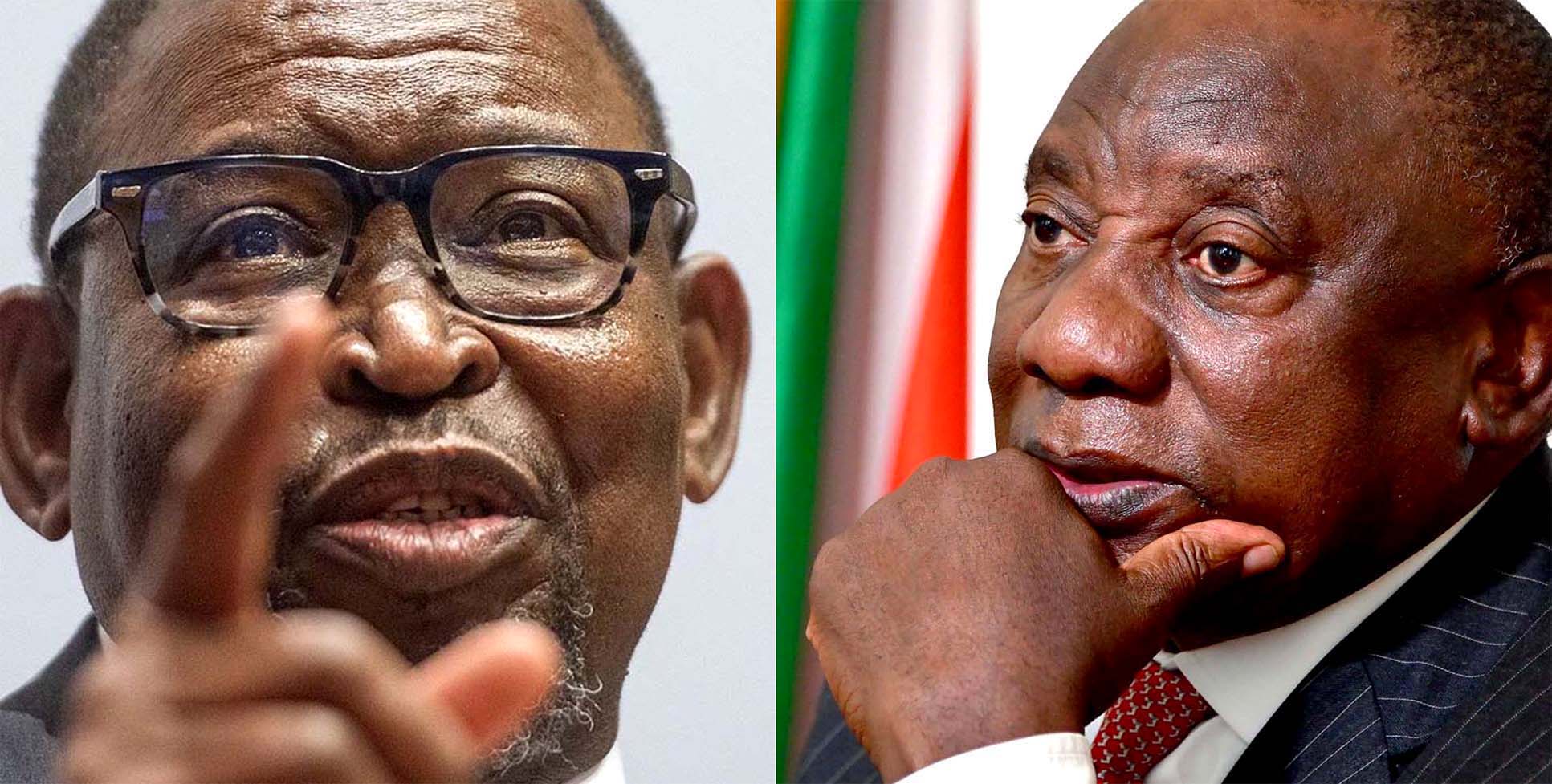In recent years, warnings that South Africa’s levels of poverty and inequality will lead to a social explosion have been made multiple times and come from multiple bona fide sources, especially civil society organisations (read this report on child hunger for example).
But permitting hunger, disease and illiteracy as a way to contain costs comes with its own costs.
In September 2021, the South African Special Risk Association (Sasria) told Scopa that the July riots were the most expensive “blitz riot” in the world for a decade. They cost more than R50-billion in direct damage, caused 374 deaths and uncounted lost jobs and livelihoods.
To cover these costs Sasria received R22-billion in the budget.
The most recent warning came from the Expert Panel into the July 2021 Civil Unrest whose December 2021 report informed President Cyril Ramaphosa that “what happened in July will definitely happen again” if matters of poverty and inequality are not addressed:
“It cannot be that almost three decades into our democracy, there is still such deep racialised poverty and inequality in our society. Without an end to or a reversal of these conditions, we will only see greater insecurity, which will require more diversion of resources to security.”
/file/dailymaverick/wp-content/uploads/2022/03/MC-Mark-1March_1.jpg)
The report suggested that the “government should pay close attention to the issues of poverty, underdevelopment and inequality”, noting politely that “… there does not seem to exist a clear plan, with budgets and a timetable, to effectively address this matter.”
An ill-informed and cruel gamble
However, while Ramaphosa and his Cabinet have heeded the call to increase the police budget, adding R8.7-billion over the next three years to facilitate the employment of an additional 12,000 constables, they chose to overlook the panel’s recommendation on measures, such as a Basic Income Grant, to reduce inequality, “to facilitate conditions and pathways for vibrant conditions for development at the level of local government”.
Instead, Cabinet chose further “fiscal consolidation” and austerity. Basing policy on a wing and a prayer, rather than social data, evidence (generated by bodies like Stats SA and the HSRC) and their constitutionally prescribed obligations, they hope that cutting taxes on the rich might lead to rises in investments and jobs.
That’s an ill-informed and cruel gamble.
It’s a gamble made even worse by the fact that the rationale behind cost-cutting has one fatal flaw: decreasing public spending on fundamental human rights is expensive. Actually, it increases costs in the short, medium and long term, as well as increasing social polarisation and instability (which, as we have seen, also has off-budget costs).
/file/dailymaverick/wp-content/uploads/2022/03/MC-Mark-1March_2.jpg)
Cutting funding to essential services, particularly to the socioeconomic human rights listed between sections 24 and 29 of the Bill of Rights, is not saving, but cost creating.
In this regard they are false economies.
What do we mean?
According to SECTION27’s analysis (available here) the health budget receives “a 4.3% reduction in funding in real terms on average each year for the next three years”. On the frontline of healthcare this means that prevention of HIV, TB, cancer and other non-communicable diseases will be undermined. More people will be infected with preventable diseases. More people will get sick. More people will die. More legal claims will successfully be made for negligence.
Each comes with a bill.
Sooner or later these unavoidable and additional costs of care will have to be carried by someone, and if it’s not going to be the state then it either means no care at all or an additional cost on the poor that will be borne most by women whose unpaid burden of care is already debilitating and the central cause of gendered poverty and joblessness.
/file/dailymaverick/wp-content/uploads/2022/03/MC-Mark-1March_3.jpg)
Similarly, when it comes to basic education:
According to the Institute for Economic Justice (see their statement here): “Between 2021/22 and 2024/25 learning and culture expenditure decreases by R13.5-billion or -2.5%.” Less money being spent on more children means poorer educational outcomes and more children without core life skills and unable to find decent jobs. From this, the IEJ says, “we can only conclude that the government has simply decided that a fundamental right, which the Constitution identifies as immediately realisable, is not as important as arbitrary macroeconomic targets which offer no benefits to people.”
In their analysis (see here) the Budget Justice Coalition, an alliance of leading civil society organisations, draws particular attention to below-inflation increases for crucial social grants like the Child Support Grant. Although the R350 Social Relief of Distress (SRD) Grant has been extended for a year, its paltry amount remains the same. The failure to commit to further extensions of this grant into 2023/24 and 2024/25 means basic income of the most vulnerable remains uncertain and results in an overall reduction of social protection spending averaging 3.0% a year over the Medium-Term Expenditure Framework.
The coalition calls for a human rights impact assessment to be conducted of this and other “individual budget decisions where human rights are impacted”.
Terminating the SRD Grant would be a sweeping and radical (of the wrong sort) reform that would wrench millions of people from an already inadequate safety net. National Treasury may deny that this is their plan but the hostility towards the right to social security that seems to infect Treasury was borne out in a comment by Treasury director-general Dondo Mogajane that in his opinion “the R44-billion for the Social Relief of Distress Grant should rather have gone to infrastructure”.
During a post-budget Twitter Space meeting a similarly worrying signal was reported by economist Duma Gqubule who claimed that he was directly approached by the minister of finance recently to participate in a process that “aims at a major overhaul of the social grant system”. He declined his services. One only wishes other economists who are clothing these decisions in their legitimacy would find similar principles.
As a result of this civil society has almost universally condemned the budget. The list of organisations that have issued statements condemning it include:
- The Assembly on the Unemployed and the Cry of the Xcluded;
- The Alternative Information and Development Centre;
- The Black Sash; and
/file/dailymaverick/wp-content/uploads/2022/03/MC-Mark-1March_4.jpg)
In this context the only civil society organisation to strike a mildly welcome note has been Outa which described “less reliance on increases to fuel levies and relief on personal and company taxes” as “encouraging”. Outa also welcomed the R18.5-billion for the Department of Water and Sanitation, calling it “a move in the right direction to address our dire water security issues” but adding that “the state of our water resources and the growing volumes of sewage into our dams and rivers demands should be treated as a national disaster”.
The problem, however, is that National Treasury is not listening.
/file/dailymaverick/wp-content/uploads/2022/03/MC-Mark-1March_5.jpg)
It regards the alternatives suggested by civil society as coming from either fools, utopians or left ideologues who do not understand the real world, and has therefore decided on its own superior wisdom. The problem is not that it does not have resources available, it is that it has discounted these many options in favour of market fundamentalism.
The best we can say is that it mistakenly believes that austerity will lay a foundation for expansion and service reinvestment from 2024.
In its defence it may, for example, point to plans afoot to introduce a wealth tax through its new requirement that “taxpayers with assets greater than ZAR 50 million declare specified assets and liabilities at market values in their 2023 tax returns”.
There are two dangers with this.
The first is that even those good initiatives that the government has launched and funded, such as the school assistants programme and the Social Employment Fund (described here by Kate Philip, the programme lead for the Presidential Employment Stimulus), will be undermined by the general deterioration in public services.
The second is that by the time Treasury decides to spend again the country may have exploded – at immense social and economic cost.
What is to be done?
In a recent article in Daily Maverick Ben Cronin reminds us:
“While the minister’s [budget] speech is portrayed as the final act determining the budget, this is not in fact true. An appropriation, just like any statute, once introduced to the legislature is then in the hands of parliamentarians.”
/file/dailymaverick/wp-content/uploads/2022/03/MC-Mark-1March_6.jpg)
Given what we have set out above, we believe that Parliament should reject this budget with reasons and send it back to the executive with a demand that they balance the books in a way that does not violate the Constitution and harm millions of people.
As Cronin put it: “Hopefully, our National Assembly will soon rise from the ashes and engage in the hard job of mobilising the full resources available to our democratic state.”
To do any less is a further dereliction of their duties. DM/MC
For those interested in better understanding the extent and nature of socioeconomic rights deprivation in South Africa, Stats SA has just published its Marginalised Groups Indicator Report 2020, available here.
[hearken id="daily-maverick/9194"]





 President Cyril Ramaphosa and Finance Minister Enoch Godongwana. (Photos: Elmond Jiyane / GCIS) / (Gallo Images / Brenton Geach)
President Cyril Ramaphosa and Finance Minister Enoch Godongwana. (Photos: Elmond Jiyane / GCIS) / (Gallo Images / Brenton Geach)